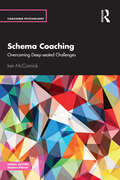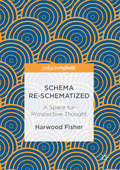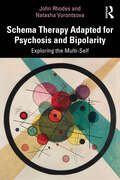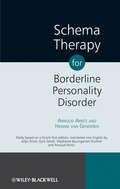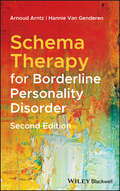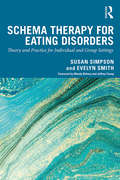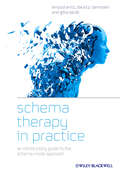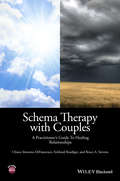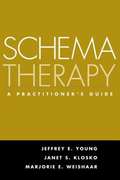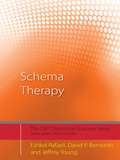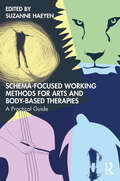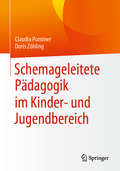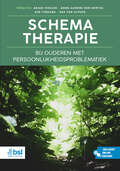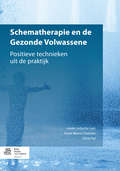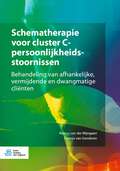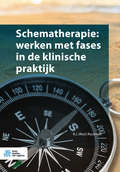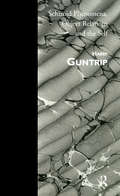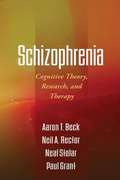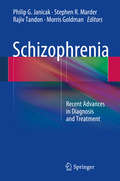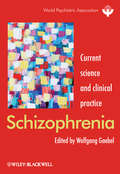- Table View
- List View
Schelling, Freud, and the Philosophical Foundations of Psychoanalysis: Uncanny Belonging (Psychology and the Other)
by Teresa FenichelSchelling, Freud, and the Philosophical Foundations of Psychoanalysis provides a long-overdue dialogue between two seminal thinkers, Schelling and Freud. Through a sustained reading of the sublime, mythology, the uncanny, and freedom, this book provokes the reader to retrieve and revive the shared roots of philosophy and psychoanalysis. Teresa Fenichel examines the philosophical basis for the concepts of the unconscious and for the nature of human freedom on which psychoanalysis rests. Drawing on the work of German philosopher F. W. J. Schelling, the author explores how his philosophical understanding of human actions, based as it was on the ideas of drives, informed and helped shape Freud’s work. Fenichel also stresses the philosophical weight of Freudian psychoanalysis, specifically in regards to the problem of freedom and argues that psychoanalysis complicates and reinforces Schelling’s basic idea: to know reality we must engage with the world empathetically and intimately. This book also serves as an introduction to Schelling’s thought, arguing that his metaphysics—particularly concerning the primacy of the unconscious and of fantasy—can be read as a therapeutic endeavor. Finally, the book offers a deep rethinking of the action and nature of sublimation through both Freud’s and Schelling’s texts. Fenichel suggests psychoanalytic therapy is self-interpretation—a recognition of our narratives as narratives, without for that reason taking them any less seriously. Schelling, Freud, and the Philosophical Foundations of Psychoanalysis will be of great interest to psychoanalysts and psychoanalytic psychotherapists as well as scholars of philosophy.
Schema Coaching: Overcoming Deep-seated Challenges (Coaching Psychology)
by Iain McCormickSchema Coaching is an informative guide for coaches, providing readers with a powerful and evidence-based approach to dealing with persistent personal difficulties.Schema coaching has a strong foundation in schema therapy which has been used in many parts of the world for over 20 years as a highly successful approach for helping clients with anxiety and depression, as well as more severe personality disorders. The book provides clear practical guidelines, illustrative case studies and reflective practice exercises to those who wish to implement a range of schema techniques when coaching with the non-clinical population. The book is in two parts, the first is primarily designed for coaches that do not have clinical, counselling or psychotherapy training and the second includes more advanced techniques which are designed for coaches with this type of training or qualifications. It also clearly sets out the ethical steps any coach should undertake before using therapeutic techniques with a client.This will be an informative and engaging resource in a new and extremely important area of coaching, suitable for coaches, coaching psychologists, coaching educators, and anyone with a general interest in this topic.
Schema Re-schematized
by Harwood FisherThis volume expands the concept and role of the schema, with three goals in mind: 1) to outline the continuing issues in the schema concept as the legacy of Kant's concept and analysis, 2) to show that Kant's challenges resulted in successful but truncated views of the schema and its functions, 3) to reconstruct Otto Selz's schema concept by proposing an alternative. The basis and scope of Selz's schema were intended to yield a more complete follow-up to Kant's challenges These had emerged out of his unresolved view of the schema as knowledge, on one hand, and thought, on the other. Selz' concepts--'anticipatory schema,' 'coordinate relations,' and 'knowledge complex'--are more inclusive and psychologically dynamic than those of his influential but reductionist detractors: Piaget, Bartlett, and Craik. Harwood Fisher explores Selz' ideas in past, present, and future temporal contexts. His predecessors' and his contemporaries' ideas influenced him. Present-day needs and future prospects round out a Selzian conception of the schema that would enrich a psychology of thought and knowledge.
Schema Therapy Adapted for Psychosis and Bipolarity: Exploring the Multi-Self
by John Rhodes Natasha VorontsovaThis book explores how Schema Therapy and its underlying theory might be used in work with clients who suffer from psychosis, bipolarity and related symptoms.The first part of the book presents in-depth qualitative research featuring first-person testimonies that describe the self-states or ‘modes’ of a person with psychosis or bipolarity. These self-states involve a range of features, such as emotions, thoughts, motivations and behaviours, which manifest as patterns. The second part proposes the adaptation and application of Schema Therapy, a transdiagnostic approach working with emotion and interpersonal functioning for clinical work with these two groups. Offering unique insights, this text will appeal to a range of practicing clinicians, such as psychologists, therapists, psychiatrists and those with a special interest in psychosis or bipolarity.
Schema Therapy for Borderline Personality Disorder
by Hannie Van Genderen Jolijn Drost Arnoud ArntzThe book was first published in Dutch by Uitgeverij Nieuwezijds - this book is an English language translation, translated from the original Dutch Language version by Jolijn Drost. The book offers a conceptual model of BPD, a treatment model and an array of methods and techniques for treating BPD clients. It covers treatment planning, the therapeutic relationships, cognitive and behavioural techniques, specific strategies, behavioural pattern breaking and the termination of therapy. The appendices contain handouts for patients including a biographical diary, forms for homework assignments and problem solving and a positive self statement log.
Schema Therapy for Borderline Personality Disorder
by Arnoud Arntz Hannie van GenderenProvides clear guidance on utilizing Schema Therapy to reduce BPD symptoms and bring about lasting changes in the patient's personality People with Borderline Personality Disorder (BPD) struggle with a range of problems that negatively impact virtually every aspect of their lives, such as constantly changing moods, blurred personal identities, impulsive behaviors, interpersonal problems, and episodes of rage. BPD patients are at high risk of self-harm and substance abuse, with approximately 10% of BPD patients dying from suicide. BPD severely affects the education, employment, personal relationships, and physical and emotional wellbeing of those suffering from the disorder. Schema Therapy (ST), based on cognitive behavioral therapy and techniques derived from experiential therapies, has been shown to achieve substantial personality improvements in BPD patients. Shema Therapy for Borderline Personality Disorder describes the pioneering BPD therapy based on insights from cognitive, behavioral, psychodynamic, humanistic, and developmental theories. Schema Therapy emphasizes the emotional processing of traumatic experiences and the use of the therapeutic relationship to bring about positive change. The text describes ST treatment for BPD in detail, covering the aims and phases of the therapy, treatment planning, cognitive and behavioral methods, specific techniques appropriate to each schema mode, behavioral pattern-breaking, termination of therapy, and more. This authoritative volume: Describes a treatment for patients with Borderline Personality Disorder (BPD) that yields substantial clinical improvement or recovery in most cases Explains the schema mode model of BPD that helps both patients and therapist understand the problems experienced by BPD patients, and that is central in ST for BPD. Explains Schema Therapy (ST) for BPD based on the schema mode model, discussing different treatment methods and techniques geared to specific schema modes Covers the latest developments in the field of ST, such as Group Schema Therapy and the application of ST for couples. Includes handouts to give to patients, including a biographical diary, forms for homework assignments and problem solving, and a positive self-statement log Schema Therapy for Borderline Personality Disorder is essential reading for clinical psychologists, psychotherapists, psychopathologists, psychiatrists, mental health practitioners, and advanced undergraduate and graduate students in relevant fields.
Schema Therapy for Eating Disorders: Theory and Practice for Individual and Group Settings
by Susan Simpson Evelyn SmithOptions can be limited for those who do not respond to standard eating disorder treatments. Schema therapy is one of the new exciting frontiers in the treatment of this clinical population, offering a much-needed model that integrates both developmental and deeper level personality factors. Schema Therapy for Eating Disorders is the first book of its kind, guiding clinicians to deliver the schema model to those with entrenched or enduring eating pathology, and in turn encouraging further clinical research on this approach to treatment. Written by an international team of leading schema therapy experts, and with a foreword by Wendy Behary and Jeffrey Young, this book draws on their clinical knowledge and research experience. Comprehensive and practical, this book introduces the rapidly growing evidence base for schema therapy, outlines the application of this model across eating disorder diagnostic groups, as well as individual and group modalities, and explores practical considerations, common challenges and the therapeutic process. The book includes detailed case examples, which provide a theoretical and practical basis for working with therapist-client schema chemistry and transference, and outlines methods of ensuring therapist self-care in the face of difficult and often long-term work. Innovative and accessible, this fresh look at the treatment of eating disorders will be an invaluable resource for clinicians in the field.
Schema Therapy in Practice: An Introductory Guide to the Schema Mode Approach
by Arnoud Arntz Gitta JacobSchema Therapy in Practice presents a comprehensive introduction to schema therapy for non-specialist practitioners wishing to incorporate it into their clinical practice. Focuses on the current schema mode model, within which cases can be more easily conceptualized and emotional interventions more smoothly introduced Extends the practice of schema therapy beyond borderline personality disorder to other personality disorders and Axis I disorders such as anxiety, depression and OCD Presented by authors who are world-respected as leaders in the schema therapy field, and have pioneered the development of the schema mode approach
Schema Therapy with Couples
by Bruce A. Stevens Eckhard Roediger Chiara Simeone-DifrancescoSchema Therapy for Couples represents the first practitioner guide to detail effective Schema Therapy techniques in couple and relationship therapy. Shows how the distinctive features of ST make it ideal for addressing the cognitive and emotion-focused problems typical in couple relationships Presents and integrates a series of innovative tools and interventions such as Schema Therapy with Needs versus Wants, Mode Cycle Clash Cards, limited re-parenting visualization, and chair work Authored by an international team of experts in couples therapy and Schema Therapy
Schema Therapy: A Practitioner's Guide
by Janet Klosko Jeffrey YoungDesigned to meet the formidable challenges of treating personality disorders and other complex difficulties, schema therapy combines proven cognitive-behavioral techniques with elements of other widely practiced therapies. This book--written by the model's developer and two of its leading practitioners--is the first major text for clinicians wishing to learn and use this popular approach. Described are innovative ways to rapidly conceptualize challenging cases, explore the client's childhood history, identify and modify self-defeating patterns, use imagery and other experiential techniques in treatment, and maximize the power of the therapeutic relationship. Including detailed protocols for treating borderline personality disorder and narcissistic personality disorder, the book is illustrated with numerous clinical examples.
Schema Therapy: Distinctive Features (CBT Distinctive Features)
by Jeffrey Young Eshkol Rafaeli David P. BernsteinSchema Therapy combines proven cognitive behavioral therapy techniques with elements of interpersonal, experiential, and psychodynamic therapies in order to help people with long-term mental health problems including personality disorders and chronic depression. Schema Therapy suggests that many negative cognitive conditions are based on past experiences, and therefore provides models for challenging and modifying negative thoughts and behaviors in order to provoke change. In this book, Eshkol Rafaeli, David P. Bernstein and Jeffrey Young – pioneers of the Schema Therapy approach – indicate the 30 distinctive features of Schema Therapy, and how the method fits into the broader CBT spectrum. Divided into two parts, Theoretical Points and Practical Points, this book provides a concise introduction for those new to the technique, as well as a discussion of how it differs from the other cognitive behavioral therapies for those experienced in the field.
Schema-Focused Working Methods for Arts and Body-Based Therapies
by Suzanne HaeyenThis book introduces schema-focused working methods for arts and body-based therapies, offering therapists practice-based tools to help their clients strengthen healthy patterns, self-management, and well-being on their path to recovery.Containing 158 schema-focused working methods for different arts and body-based therapies, such as art therapy, dance therapy, drama therapy, music therapy, and body-based or psychomotor therapy, this book offers new ideas and tools for therapists to strengthen their client’s adaptive schema modes: the Healthy Adult and the Happy Child. By linking arts and body-based therapies to schema-focused therapy and positive psychology, the goal is to strengthen the client’s healthy patterns in emotion regulation and establish a healthier well-being.The theoretical framework in the introduction and the scientific evidence for arts and psychomotor therapies, combined with the practice-based examples, allow for a text that is broad enough for graduate creative therapy programs and specific enough to serve as a shelf reference for those in practice.
Schemageleitete Pädagogik im Kinder- und Jugendbereich
by Claudia Pommer Doris ZöhlingSchemageleitete Pädagogik ist die konsequente Anwendung des aktuellen Wissensstandes über die Folgen und Symptome von stark belasteten Kinder- und Jugendlichen mit ihren Familiensystemen zur Gestaltung des sozialpädagogischen Alltags. Dabei baut sie eine Brücke von der Schematherapie zur sozial- und heilpädagogischen Praxis in Kindergärten, Schulen und Kinder- und Jugendhilfeeinrichtungen. Für ErzieherInnen, LehrerInnen, SozialpädagogInnen, PsychologInnen und SozialarbeiterInnen dient das Buch als Einführung in dieses innovative Konzept und praktische Handreichung.
Schematherapie bij ouderen met persoonlijkheidsproblematiek
by Bas Van Alphen Arjan Videler Anne-Aurore den Hertog Kim TurksmaDit boek laat zien hoe je schematherapie kunt toepassen bij ouderen met persoonlijkheidsproblematiek. Het kan gebruikt worden voor zowel individuele als groepstherapie. Het boek biedt veel praktische handvatten, voor zowel de ggz als het verpleeghuis. Schematherapie bij ouderen met persoonlijkheidsproblematiek laat aan de hand van casuïstiek uit de klinische praktijk en onderbouwd met actuele wetenschappelijke evidentie zien dat schematherapie een waardevolle behandeling is, ongeacht leeftijd. Wanneer kies je voor een behandeling in een groep of individueel? Hoe betrek je naasten? Wat is de meerwaarde van de inzet van vaktherapie? Hoe motiveer je ouderen en wat kun je doen als een schematherapiebehandeling stagneert? Hoe beleeft een oudere zelf een langdurig therapietraject? Niet eerder verscheen er een boek over het jonge vakgebied van schematherapie bij ouderen. Het boek is bestemd voor psychologen, psychiaters, vaktherapeuten en andere professionals, die werkzaam zijn in de ggz of in een verpleeghuis. De redactie, prof. dr. Arjan Videler, Anne-Aurore de Hertog, Kim Turksma en prof. dr. Bas van Alphen werkt al jaren met schematherapie bij ouderen en is actief als clinicus, docent en onderzoeker.
Schematherapie en de Gezonde Volwassene: Positieve technieken uit de praktijk
by Silvia Pol Anne-Marie ClaassenTherapeuten zijn al twee decennia enthousiast over het werken met Schematherapie. De effectiviteit van Schematherapie is hoog en de positieve resultaten zijn internationaal erkend en bevestigd. In de Schematherapie wordt de Gezonde Volwassene gepositioneerd tegenover de kwetsbare kanten en destructieve kanten van de cliënt. In dit boek worden vanuit verschillende disciplines interventies beschreven, die specifiek ontwikkeld zijn voor het vergroten en versterken van de Gezonde Volwassene. Deze interventies komen zowel uit de Schematherapie zelf als uit de Positieve Psychologie en Mindfulness. Deze laatste stromingen winnen gestaag aan populariteit en maken gebruik van inspirerende technieken en begrippen als welbevinden en compassie. De auteurs houden een pleidooi voor een verdere integratie van de Schematherapie en deze nieuwe, krachtgericht werkende stromingen. Hierdoor kan de Schematherapie nog effectiever zijn. De Gezonde Volwassene wordt daarbij- niet als modus maar als mens- een kracht in het omgaan met de complexe uitdagingen van het leven. Anne-Marie Claassen en Silvia Pol werken beiden reeds jaren met Schematherapie en hebben zich samen met collega's vanuit verschillende disciplines met name gericht op het beschrijven van de praktische toepassingen van positieve technieken in de (groeps-) schematherapie.
Schematherapie voor cluster C-persoonlijkheidsstoornissen: Behandeling van afhankelijke, vermijdende en dwangmatige cliënten
by Hannie van Genderen Remco van der WijngaartDit boek helpt therapeuten om schematherapie toe te passen bij cliënten met afhankelijke, vermijdende of dwangmatige persoonlijkheidsstoornissen, ook wel cluster C-persoonlijkheidsstoornissen genoemd. Schematherapie is een zeer effectieve behandelmethode voor cluster C-stoornissen. De meeste literatuur en trainingen op het gebied van schematherapie richten zich echter op de behandeling van de borderline persoonlijkheidsstoornis of andere vormen van externaliserende problematiek. Dit boek laat zien hoe schematherapie effectief toepasbaar is bij internaliserende persoonlijkheidsproblematiek. Schematherapie voor cluster C-persoonlijkheidsstoornissen - Behandeling van afhankelijke, vermijdende en dwangmatige cliënten beschrijft hoe cluster C-stoornissen begrepen kunnen worden in termen van basisbehoeften, schema’s en modi. Daarnaast wordt ook beschreven hoe limited reparenting op een andere manier vormgegeven wordt in deze behandeling dan bij meer externaliserende problematiek. Ten slotte worden specifieke knelpunten, varianten en toepassingen van methoden en technieken beschreven die nog niet terug te vinden zijn in andere literatuur over schematherapie. Het boek begint met een beschrijving van onder meer geschiedenis en onderzoek. Daarna gaat het in op casusconceptualisatie en de stap van conceptualisatie naar behandeling. Vervolgens behandelt het de verschillende persoonlijkheidsstoornissen waarbij steeds beschreven wordt hoe methoden en technieken anders toegepast worden in de verschillende behandelfasen. Ten slotte gaat het in op methoden om de gezonde volwassene te versterken en de therapieresultaten in de toekomst te behouden. Het boek bevat veel aansprekende casuïstiek. De auteurs zijn psychotherapeut en gz-psycholoog Remco van der Wijngaart, en klinisch psycholoog Hannie van Genderen.
Schematherapie: werken met fases in de klinische praktijk
by R. J. Rosi ReubsaetDit praktijkboek laat zien hoe je fasegericht kunt werken in schematherapie. Door fases toe te passen met elk een eigen doel en houding werk je, in teamverband of alleen, stap voor stap naar het einde. Het boek biedt een leidraad voor een optimale balans tussen cognitieve, gedragsmatige en experiëntiële technieken, meegaan en confronteren, vallen en opstaan, vertrouwen en begrenzen, werken en spelen. Schematherapie: werken met fases in de klinische praktijk kiest, tussen alle boeken over schematherapie, een unieke invalshoek. Je krijgt handvatten om het complexe therapieproces overzichtelijk te houden en tegelijkertijd meer diepgang en emoties te bereiken. Je creativiteit en enthousiasme worden aangewakkerd. Je zelfvertrouwen groeit en je durft meer. Het boek begint met een korte weergave van de theoretische kaders van schematherapie en groepsschematherapie. Ook komt aan de orde waar en waarom het in de praktijk vaak mis gaat. Door de behandeling consequent op te delen in fases met elk een eigen kader, thema, basisbehoefte en aanpak houd je grip op de therapie. De vier verschillende fases worden in de daaropvolgende hoofdtukken toegelicht en uitgewerkt. Elk hoofdstuk bevat tevens voorbeelden van oefeningen, aandachtspunten en tips. Het laatste hoofdstuk geeft antwoord op veel gestelde vragen over het werken met schematherapie en praktische handvatten voor de dagelijkse praktijk. Rosi Reubsaet werkt als klinisch psycholoog met individuele schematherapie en groepsschematherapie, en als supervisor en docent schematherapie. De fasegerichte werkwijze bracht ze tot stand samen met haar collega’s van de Academie voor Schematherapie. Samen willen ze hun ervaringen en oplossingen door geven aan collega’s, zodat zij, en hun cliënten, met meer vertrouwen aan de slag kunnen.
Schicksal und Psychotherapie: Therapieschulübergreifende Anregungen (essentials)
by Ralf T. VogelDer Schicksalsbegriff ist, obwohl im wissenschaftlichen Diskurs aus der Mode gekommen, für die praktisch-psychotherapeutische Tätigkeit von hoher Relevanz und wird von Therapeutinnen und PatientInnen, explizit oder implizit, für kausale und prospektive Zwecke genutzt. Die vorliegende Schrift möchte, ausgehend von den philosophischen Grundannahmen hierzu, zu einer Auseinandersetzung mit den vielen Facetten des Schicksalsbegriffs anregen und einen Beitrag zur eigenen Stellung ,dem Schicksal gegenüber' betragen. Schließlich werden therapierelevante Folgerungen abgeleitet.
Schizo
by Nic SheffT<P>he fascinating, shocking, and ultimately quite hopeful story of one teen's downward spiral into mental illness by the bestselling author of Tweak. <P>Miles's little brother Teddy is missing. The police believe he drowned at the beach--the very same day Miles had his first schizophrenic episode. But Miles knows better--Teddy is alive. Kidnapped. There was even a witness! Fueled by guilt, Miles sets off to rescue Teddy. <P>There is so much to overcome, though. The endless pills he must take. The girl who steals his heart and plays with it. The black crows that follow him. As s<P>een through Miles's distorted perception, his world closes around him as he pushes to keep it open. What you think you know about his world is actually a blur of gray, though, and the sharp focus of reality proves startling.
Schizo-Obsessive Disorder
by Michael PoyurovskyThis is the first book to address the clinical and neurobiological interface between schizophrenia and obsessive-compulsive disorder (OCD). There is growing evidence that obsessive-compulsive symptoms in schizophrenia are prevalent, persistent and characterized by a distinct pattern of familial inheritance, neurocognitive deficits and brain activation. This text provides guidelines for differential diagnosis of schizophrenic patients with obsessive-compulsive symptoms, and patients with primary OCD alongside poor insight, psychotic features or schizotypal personality. Written by a leading expert in the coexistence of obsessive-compulsive and schizophrenic phenomena, Schizo-Obsessive Disorder uses numerous case studies to present diagnostic guidelines and to describe a recommended treatment algorithm, demystifying this complex disorder and aiding its effective management. The book is essential reading for psychiatrists, neurologists and the wider range of multidisciplinary mental health practitioners.
Schizoanalysis and Schizodrama: Clinic and Politics
by Domenico Uhng HurThis book presents theoretical and methodological contributions to the development of mental health interventions that combine clinical and political approaches based on schizoanalysis and schizodrama. It seeks to make the transition from the philosophy of schizoanalysis to the applied field of intervention of a clinic-politics with strong inspiration from schizodrama. Created in the early 1970s by the French philosopher Gilles Deleuze in partnership with French psychoanalyst Félix Guattari, schizoanalysis is a philosophical approach that departs from the psychoanalytic inquiry of desire and affection as the main drivers of the processes of subjectivation to create a Philosophy of Difference that aims at mapping and contributing to the emergence of different forms of subjectivity not submitted to traditional forms of psychic and social coercion. Inspired by this innovative theoretical approach, the Argentinian psychiatrist Gregorio Baremblitt developed an original kind of schizoanalysis in Latin America called schizodrama, which aims at creating intervention devices, both clinical and political, to operationalize schizoanalysis&’ philosophical concepts. Building upon the contributions of schizodrama, this book seeks to contribute to operationalize the &“migration&” of schizoanalysis to the fields of psychology and social intervention. Schizoanalysis and Schizodrama: Clinic and Politics will be of interest to mental health professionals – such as psychologists, psychiatrists and clinical social workers – as well as to researchers in the human, social and health sciences interested in learning about this new theoretical field and its various modes of clinical-political intervention. This is a revised edition of a book originally published in Brazilian Portuguese. The original manuscript was written in Brazilian Portuguese and translated into English with the help of artificial intelligence. A subsequent human revision was done primarily in terms of content.
Schizoid Phenomena, Object Relations and the Self
by Harry GuntripBased on a series of clinical studies of schizoid problems, this book is a sequel to Harry Guntrip's theoretical study of the emergence of the schizoid problem, Personality Structure and Human Interaction (1961). It includes revised versions of earlier papers, and also much original material.
Schizophrenia
by Aaron Beck Neil RectorFrom Aaron T. Beck and colleagues, this is the definitive work on the cognitive model of schizophrenia and its treatment. The volume integrates cognitive-behavioral and biological knowledge into a comprehensive conceptual framework. It examines the origins, development, and maintenance of key symptom areas delusions, hallucinations, negative symptoms, and formal thought disorder. Treatment chapters then offer concrete guidance for addressing each type of symptom, complete with case examples and session outlines. Anyone who treats or studies serious mental illness will find a new level of understanding together with theoretically and empirically grounded clinical techniques.
Schizophrenia
by Philip G. Janicak Stephen R. Marder Rajiv Tandon Morris GoldmanSchizophrenia: Recent Advances in Diagnosis and Treatment is a major addition to the literature, offering practical, comprehensive coverage of diagnosis and treatment options, genetic issues, neuroimaging, long-term management of schizophrenia, and future directions and predictions of how clinical care of schizophrenia will change The book is divided into five sections. Section 1 summarizes the present state of knowledge about the diagnosis and treatment of schizophrenia. This includes recent changes in the DSM 5 categorization of schizophrenia and its implications for treatment. Section 2 considers recent discoveries into its pathoetiology, including the status of biological markers, genetics and neuroimaging as they relate to diagnosis and potential novel therapeutic approaches. Section 3 explores the optimization of present therapeutic approaches; novel treatments; and management of the substantial risks associated with both the illness and its present therapies. Section 4 discusses progress in the long-term management of schizophrenia, focusing on biological and psychotherapeutic strategies to improve functioning and facilitate recovery Section 5 considers future directions and predictions of how diagnosis and treatment of schizophrenia will change An invaluable addition to the field, Schizophrenia: Recent Advances in Diagnosis and Treatment is a definitive resource that will be of great interest to all clinicians caring for patients with schizophrenia.
Schizophrenia
by Wolfgang GaebelThe first book in a new series from the World Psychiatric Association, Schizophrenia: current science and clinical practice presents recent information on the diagnosis, neurobiological foundations, and management of schizophrenia. It evaluates the findings obtained with modern techniques like magnetic resonance imaging, genetics and network analyses. The book reviews the importance of neurocognitive functioning in schizophrenia and its predictive value for functional capacity. It covers the key areas of early recognition, prevention, rehabilitation and stigma. There is also a critical discussion of diagnostic classification and the revision of the two major international systems. Written by experts in the field who have a track record of being engaging authors, this book provides a rapid overview of the current state of the art in schizophrenia research and clinical management. It will be invaluable to all psychiatrists, psychologists, neuropharmacologists, researchers in psychiatry and psychopharmacology in academia and in industry, and clinical and behavioural neuroscientists.

